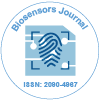Our Group organises 3000+ Global Events every year across USA, Europe & Asia with support from 1000 more scientific Societies and Publishes 700+ ������ý Access Journals which contains over 50000 eminent personalities, reputed scientists as editorial board members.
������ý Access Journals gaining more Readers and Citations
700 Journals and 15,000,000 Readers Each Journal is getting 25,000+ Readers
Indexed In
- Index Copernicus
- Google Scholar
- Genamics JournalSeek
- RefSeek
- Hamdard University
- EBSCO A-Z
- OCLC- WorldCat
Useful Links
Recommended Journals
Related Subjects
Share This Page
The connection between chemistry and electric function in solids
4th International Conference on Electrochemistry
Joachim Maier
Max Planck Institute for Solid State Research, Germany
Keynote: Biosens J
DOI:
Abstract
In loose terms chemistry is the chemistry of the perfect state (perfect crystallographic structure) plus chemistry of the excited state (defect structure). The latter is responsible for the electric transport and storage properties. In aqueous solutions this function is taken by H+ and OH- ions as well as dissolved ions. In solids this role is carried out by point defects such as excess (interstitials) and lacking particles (vacancies). It is exactly the consideration of point defect chemistry which is necessary to understand and tune ionic transport phenomena in solids hence forming the bridge between chemistry and electric function. This picture also comprises the electronic transport enabled by excess electrons and electron holes. It is shown how the charge carrier chemistry can be understood, analyzed and varied as a function of stoichiometry and doping not only in the bulk but also at interfaces. Of special interest are size effects on the electronic and ionic carrier concentrations. These defect-chemical considerations directly translate into the electric function in batteries, fuel cells and photo-electrochemical devices. This does not only hold at or near equilibrium, also the kinetic performance depend on such issues. In addition to transport-related questions, the point defects are most relevant acid-base or redox-active centers and are thus of central significance, not only for transport, but also for reaction kinetics and catalysis. A selection of applied examples such as storage modes in batteries, reaction kinetics in fuel cells or transport effect in photo-perovskites will be addressed. Recent Publications 1. Maier J (2005) Nanoionics: ion transport and electrochemical storage in confined systems. Nature Materials 4:805â�?�?815. 2. Maier J (2013) Thermodynamics of electrochemical lithium storage. Angewandte Chemie International Edition 52:4998â�?�? 5026. 3. Chen C C, Fu L J and Maier J (2016) Synergistic, ultrafast mass storage and removal in artificial mixed conductors. Nature 536:159â�?�?164. 4. Zhu C, Usiskin R, Yu Y and Maier J (2017) The nanoscale circuitry of battery electrodes. Science DOI: 10.1126/science. aao2808. 5. Yang T Y, Gregori G, Pellet N, Gr�?¤tzel M and Maier J (2015) The significance of ion conduction in a hybrid organicâ�?�? inorganic lead-iodide-based perovskite photosensitizer. Angewandte Chemie International Edition 54:7905â�?�?7910.Biography
Joachim Maier studied Chemistry at the University of Saarbrücken, received his PhD in 1982 from the same university and completed his Habilitation at the University of Tübingen in 1988. He has lectured at the University of Tübingen, at Massachusetts Institute of Technology as a foreign Faculty Member, at the University of Graz as a Visiting Professor, and at the University of Stuttgart as an Honorary Professor. He is Past President of the International Society of Solid State Ionics. As Director of the Physical Chemistry Department (since 1991) of the Max Planck Institute for Solid State Research and Member of various national and international academies his concern is the conceptual understanding of chemical and electrochemical phenomena involving solids as well as their use in materials science. He has been listed as one of the most influential scientific minds (Thomson Reuters).
Email:s.weiglein@fkf.mpg.de
